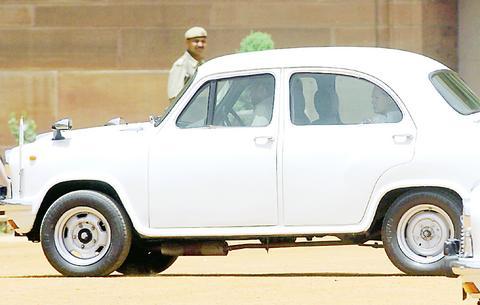Sonia Gandhi announced yesterday that she would not become India's first foreign-born prime minister, stunning her supporters and the nation.
"The post of prime minister has not been my aim," she told members of her Congress party in the central hall of Parliament.
"I was always certain that if ever I found myself in the position I am in today, I would follow my inner voice. I humbly decline the post," she said.

PHOTO: AFP
Gandhi shunned the top job even though her Congress party and its allies trounced the Hindu-nationalist party of caretaker Prime Minister Atal Bihari Vajpa-yee and his Democratic National Alliance in national elections that ended last week.
She said she was acting in the interest of the nation.
Her party reacted with uproar. Congress lawmakers shouted and pleaded with Gandhi to change her mind. She had to stop speaking several times to get the audience to quiet down.
"I request you to accept my decision," she said, adding that she would not reconsider.
Her decision came after Hindu nationalist outrage grew against her Italian origins and her background as a Roman Catholic, as well as investor fears that she would not be able to withstand demands from leftist allies to peel back market-driven reforms that have made India's economy boom.
Earlier yesterday, Gandhi met with President A.P.J. Abdul Kalam but did not, as widely expected, leave with his approval to form a minority government that would be dependent on the outside support of two communist parties.
"It is my inner voice, my conscience," she said of her decision to withdraw.
"My responsibility at this critical time is to provide India with a secular government that is strong and stable," Gandhi said.
Congress sources said Gandhi had put forward Manmohan Singh and Pranab Kumar Mukerjee, two former finance ministers, as possible candidates for the prime minister's post.
Somnath Chatterjee, a legislator from the Communist Party of India-Marxist, suggested that Gandhi's decision was based on fears for her family, which is India's top political dynasty.
"There are rumors that her children are against her becoming prime minister, maybe because of security reasons," he said.
Some Hindu nationalists took to the streets yesterday saying a foreigner should not lead India, even though Gandhi has been an Indian citizen for more than two decades.
"A foreigner becoming the prime minister of the country will put national security and the country's self-respect in jeopardy," Uma Bharti, a former sports minister in outgoing Vajpayee's government, was quoted as saying by the Press Trust of India news agency.
Also See Story:

A fire caused by a burst gas pipe yesterday spread to several homes and sent a fireball soaring into the sky outside Malaysia’s largest city, injuring more than 100 people. The towering inferno near a gas station in Putra Heights outside Kuala Lumpur was visible for kilometers and lasted for several hours. It happened during a public holiday as Muslims, who are the majority in Malaysia, celebrate the second day of Eid al-Fitr. National oil company Petronas said the fire started at one of its gas pipelines at 8:10am and the affected pipeline was later isolated. Disaster management officials said shutting the

UNREST: The authorities in Turkey arrested 13 Turkish journalists in five days, deported a BBC correspondent and on Thursday arrested a reporter from Sweden Waving flags and chanting slogans, many hundreds of thousands of anti-government demonstrators on Saturday rallied in Istanbul, Turkey, in defence of democracy after the arrest of Istanbul Mayor Ekrem Imamoglu which sparked Turkey’s worst street unrest in more than a decade. Under a cloudless blue sky, vast crowds gathered in Maltepe on the Asian side of Turkey’s biggest city on the eve of the Eid al-Fitr celebration which started yesterday, marking the end of Ramadan. Ozgur Ozel, chairman of the main opposition Republican People’s Party (CHP), which organized the rally, said there were 2.2 million people in the crowd, but

The US government has banned US government personnel in China, as well as family members and contractors with security clearances, from any romantic or sexual relationships with Chinese citizens, The Associated Press (AP) has learned. Four people with direct knowledge of the matter told the AP about the policy, which was put into effect by departing US ambassador Nicholas Burns in January shortly before he left China. The people would speak only on condition of anonymity to discuss details of a confidential directive. Although some US agencies already had strict rules on such relationships, a blanket “nonfraternization” policy, as it is known, has

OPTIONS: Asked if one potential avenue to a third term was having J.D. Vance run for the top job and then pass the baton to him, Trump said: ‘That’s one,’ among others US President Donald Trump on Sunday that “I’m not joking” about trying to serve a third term, the clearest indication he is considering ways to breach a constitutional barrier against continuing to lead the country after his second term ends at the beginning of 2029. “There are methods which you could do it,” Trump said in a telephone interview with NBC News from Mar-a-Lago, his private club. He elaborated later to reporters on Air Force One from Florida to Washington that “I have had more people ask me to have a third term, which in a way is a fourth term